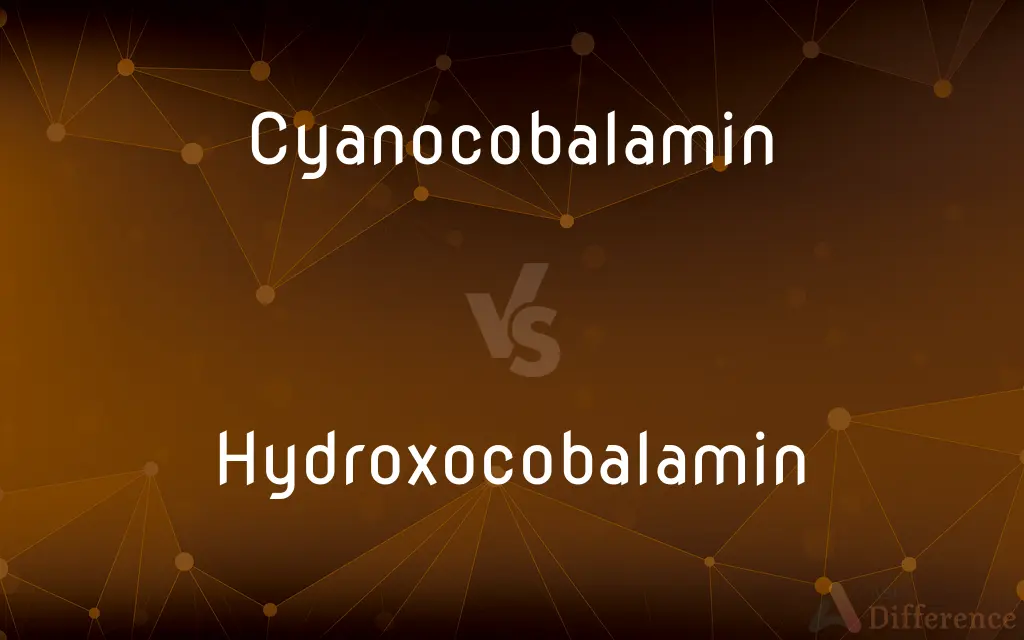Cyanocobalamin vs. Hydroxocobalamin — What's the Difference?
By Maham Liaqat & Fiza Rafique — Updated on May 2, 2024
Cyanocobalamin is a synthetic form of vitamin B12 often used in supplements, while hydroxocobalamin is a natural form more commonly used in medical treatments.

Difference Between Cyanocobalamin and Hydroxocobalamin
Table of Contents
ADVERTISEMENT
Key Differences
Cyanocobalamin is a manufactured form of vitamin B12, commonly found in oral supplements and fortified foods. It is not present in nature but is produced industrially by bacterial fermentation and is known for its stability and cost-effectiveness. On the other hand, hydroxocobalamin occurs naturally and is primarily derived from bacterial sources, making it a common choice for clinical settings, particularly in injections.
While cyanocobalamin must be converted by the body into active forms of vitamin B12 (methylcobalamin or adenosylcobalamin) to be utilized, hydroxocobalamin has an advantage as it is already closer to these active forms. This makes hydroxocobalamin potentially more effective for immediate use in remedying B12 deficiencies.
Cyanocobalamin has a cyanide molecule, which although it is in minuscule and harmless amounts, requires removal by the body. Whereas, hydroxocobalamin is often preferred in clinical settings for its ability to bind with cyanide and remove it from the body, which is useful in treating cyanide poisoning.
The shelf life and storage of cyanocobalamin tend to be more favorable due to its synthetic stability. Conversely, hydroxocobalamin, being a natural form, may require more careful handling and storage conditions to maintain its efficacy over time.
In terms of cost and availability, cyanocobalamin is typically less expensive and more widely available in various forms including tablets, injections, and nasal sprays. Hydroxocobalamin, on the other hand, is often more costly and primarily found in injectable forms, used under medical supervision.
ADVERTISEMENT
Comparison Chart
Form
Synthetic
Natural
Source
Bacterial fermentation (industrial)
Bacterial sources (natural)
Primary Use
Supplements, fortified foods
Medical treatments, injections
Conversion in Body
Requires conversion to active forms
Closer to active forms, minimal conversion
Associated Molecule
Contains cyanide molecule
Binds with and helps remove cyanide
Compare with Definitions
Cyanocobalamin
A synthetic version of vitamin B12 used primarily in dietary supplements.
Vegetarians often take cyanocobalamin supplements to prevent B12 deficiency.
Hydroxocobalamin
A natural form of vitamin B12 used in clinical treatments.
Hydroxocobalamin injections are administered to treat severe B12 deficiencies.
Cyanocobalamin
Used to treat B12 deficiency that cannot be corrected with diet.
She received a cyanocobalamin injection to quickly elevate her B12 levels.
Hydroxocobalamin
Requires careful storage to maintain efficacy.
The clinic ensures hydroxocobalamin is stored in a cool, dark place.
Cyanocobalamin
A common form of B12 supplement taken orally.
He adds a cyanocobalamin tablet to his daily regimen for better health.
Hydroxocobalamin
Mostly available through prescription in injectable form.
You'll need a prescription to obtain hydroxocobalamin from a pharmacy.
Cyanocobalamin
Often added to fortified foods like cereals.
Breakfast cereals fortified with cyanocobalamin can help prevent B12 deficiency.
Hydroxocobalamin
Often used in emergency medicine to combat cyanide poisoning.
Firefighters exposed to smoke may receive hydroxocobalamin injections as a precaution.
Cyanocobalamin
The body converts cyanocobalamin into active forms after ingestion.
Cyanocobalamin absorption requires proper stomach acidity and intrinsic factor.
Hydroxocobalamin
Generally more expensive than synthetic B12 forms.
Due to its cost, hydroxocobalamin is usually prescribed when specifically needed.
Cyanocobalamin
Cyanocobalamin is a manufactured form of vitamin B12 used to treat vitamin B12 deficiency. The deficiency may occur in pernicious anemia, following surgical removal of the stomach, with fish tapeworm, or due to bowel cancer.
Hydroxocobalamin
Hydroxocobalamin, also known as vitamin B12a and hydroxycobalamin, is a vitamin found in food and used as a dietary supplement. As a supplement it is used to treat vitamin B12 deficiency including pernicious anemia.
Cyanocobalamin
See vitamin B12.
Hydroxocobalamin
(vitamin) A natural analog of vitamin B12, a basic member of the cobalamin family of compounds, with an intense red color.
Cyanocobalamin
(vitamin) A synthetic form of vitamin B12 (cobalamin).
Cyanocobalamin
A B vitamin that is used to treat pernicious anemia
Common Curiosities
How is cyanocobalamin absorbed in the body?
Cyanocobalamin requires conversion into active forms of vitamin B12 in the body, a process that depends on proper liver function and intrinsic factors in the gut.
Why is hydroxocobalamin preferred for treating cyanide poisoning?
Hydroxocobalamin helps detoxify cyanide by binding to it and forming a compound that is excreted from the body, making it highly effective in emergency treatments.
Is hydroxocobalamin more effective than cyanocobalamin for vitamin B12 deficiency?
Hydroxocobalamin is often considered more effective for immediate treatment of severe B12 deficiencies due to its quicker conversion to active forms in the body.
What are the main differences between cyanocobalamin and hydroxocobalamin?
Cyanocobalamin is a synthetic, stable form of vitamin B12 used in dietary supplements, whereas hydroxocobalamin is a natural form used primarily in clinical treatments and is effective in detoxifying cyanide.
Can vegetarians use cyanocobalamin effectively?
Yes, cyanocobalamin is an effective and popular choice among vegetarians and vegans to ensure adequate B12 intake.
What forms does cyanocobalamin come in?
Cyanocobalamin is available in various forms, including tablets, capsules, nasal sprays, and injections.
Can cyanocobalamin cause side effects?
While generally safe, cyanocobalamin can cause mild side effects like diarrhea, itching, or swelling, especially at injection sites.
How often are hydroxocobalamin injections given for B12 deficiency?
The frequency can vary based on the severity of the deficiency and the patient's response, typically ranging from monthly to bi-monthly injections after an initial loading phase.
Is there a taste difference between cyanocobalamin and hydroxocobalamin supplements?
Since both are typically administered via injection or in pill form, taste is generally not applicable, though oral forms like lozenges might have flavoring agents.
What are the storage requirements for hydroxocobalamin?
Hydroxocobalamin should be stored in a cool, dark place to maintain its stability and efficacy.
What is cyanocobalamin?
Cyanocobalamin is a synthetic form of vitamin B12 commonly used in supplements and food fortification.
Share Your Discovery

Previous Comparison
Estradiol vs. Estrogen
Next Comparison
Deed vs. IndentureAuthor Spotlight
Written by
Maham LiaqatCo-written by
Fiza RafiqueFiza Rafique is a skilled content writer at AskDifference.com, where she meticulously refines and enhances written pieces. Drawing from her vast editorial expertise, Fiza ensures clarity, accuracy, and precision in every article. Passionate about language, she continually seeks to elevate the quality of content for readers worldwide.












































